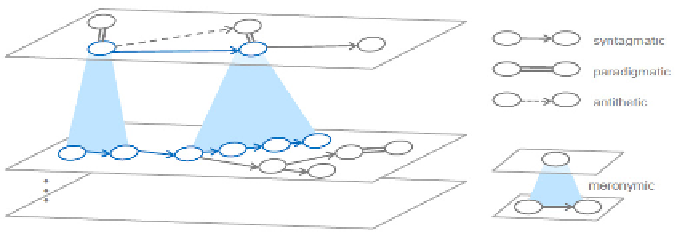Information Technology Reference
In-Depth Information
a coherent sequence of events; b) for each position in the sequence, several alternative
choices should apply; c) non-trivial interesting sequences must permit unexpected
shifts along the way; and d) one may need to go down to details to better visualize the
events or, conversely, to summarize detailed event sequences. These concerns have
led to the identification of four relations between pairs of events that play a basic role
in a story, and to the introduction of a fourfold perspective of plot composition in the
context of IS. The four relations are: a)
syntagmatic
- the occurrence of the first
leaves the world in a state wherein the occurrence of the second is coherent. The
syntagmatic relation between events induces a weak form of causality or enablement,
which justifies their sequential ordering inside the plot; b)
paradigmatic -
the events
can be seen as alternative ways to accomplish a similar kind of higher-level action, so
that both achieve the same basic effect in a significantly different way; c)
antithetic -
the events oppose or contradict each other, since the occurrence of each of them
implies a radically different context; and d)
meronymic
- referring to the
decomposition of an event into lower-level events, thus providing a more detailed
account of the action on hand.
The first two relations were already handled in LOGTELL. To extend its
functionality, we included the use of a hierarchy of (generalized) events and plan-
recognition mechanisms during the plot composition phase [8]. This hierarchy
consists of a conveniently structured library containing sequences of events with
partial order relationships between them, which can be adapted if necessary to
specific circumstances. The typical plans (also called complex operations) stored in
the library result from meronymic relations between other operations (Propp-
inspired). Complex operations formed by generalization are also represented,
branching down to specialized operations corresponding to alternative ways to reach
the same main effects.
Transgressive plots based on antithetic relations can add a dramatic impact, by
introducing unexpected turns in the narrative, e.g. by the sudden recognition of a
wrong belief, or by a radical change of fortune (Aristotle's "discovery" and
"reversal"). If his beloved princess is abducted, the hero would normally rescue her -
but the antithetically related capture event would be justified if she unexpectedly falls
in love with the captor (the so-called Stockholm syndrome). Mechanisms to support
this kind of dramatic change must be provided, one of the possibilities being to allow
arbitrary user interventions at certain points (recalling the
deus ex-machina
device).
Fig. 1.
Relations between events in the story space [6]

